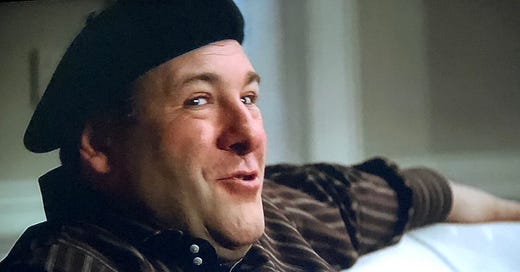
I love a clip show, and I love “Moonlight Mile,” so obviously I love “Kaisha,” a clip show bookended by “Moonlight Mile.” One of those episodes that feels frankensteined together from plots — and I’m using the word “plots” very loosely here — discarded from other episodes, it’s very montage-heavy, not particularly story-driven, and sort of the pinnacle of what some viewers of The Sopranos found endlessly frustrating. I imagine that segment of the audience must have found the episode particularly aggravating because it begins by throwing them a hefty bone. After an opening scene set to a Rolling Stone song, a restaurant bombing narrowly misses killing Phil and ramps up the tension between New York and New Jersey even further. I mean, the first few minutes are pretty much what Scorsese’s harshest detractors and most feeble-minded fans think his entire filmography is.
But — in what I would argue is, in fact, a very Scorsese move — that early excitement gets swept into the current of people making the same errors over and over, giving into recurring patterns that manifest in both their individual lives and across generations and communities. (I mean, Phil does end up in grave condition by the end of the episode, but it’s caused by stress and the fragility of his own aging body, not anyone else’s violence.) Combine that with a somber Christmas backdrop, and you get a nice don’t the holidays make you feel like shit companion piece to “To Save Us All From Satan’s Power” — but even that callback is more of a lingering vibe than a point that gets hammered home.
Most of the episode focuses on Christopher, who repeats Tony’s mistakes without knowing it. Julianna is his Gloria; even though their relationship is less combative than that of their predecessors, it’s equally self-destructive and equally inextricable from Christopher’s issues with another woman. (Although I will note that where Gloria had Big Livia Energy, Julianna and Adriana are distinctly unalike.) Like Gloria, Julianna wouldn’t be here if not for her all-consuming self-hatred and her fundamental conviction that she deserves to be punished. Like Tony, Christopher struggles to thread the needle between his desperation to be understood and his fear of being truly known. He never lets Julianna see all of himself — on several occasions, he stops just short of confessing what happened to Adriana — but she still, on instinct alone, knows him more accurately than any other living person could.
Tony, despite his general lack of perceptiveness, draws a clear line between Julianna, Gloria, and Melfi. Yes, he only verbalizes it to be an asshole during therapy, and yes, his take on their similarities is largely superficial: they’re all dark-haired, smart, independent. (And yes, to answer your logical next question, a lot of my self-confidence comes from the knowledge that if Tony Soprano were a real person, he would absolutely have a crush on me.) But there’s also the fact that they all made him realize they see/saw through his bullshit, that they — like Julianna is also doing to Christopher — all forced him into the mortifying ordeal of being known and didn’t even grant him the rewards of being loved to soften the blow.
That’s not to say that Carmela doesn’t know him deeply (or to say decisively that she does or does not love him), but she’s happy to indulge his fantasy of her cluelessness as long as she gets what she wants from him, and he’s happy to accept that indulgence even though he must know it’s a farce. When she presses him on hiring an investigator to find Adriana, he pulls strings to get her spec house permit, and then they both move on as if nothing happened. The same logic of exchange structures AJ’s burgeoning first relationship: he doesn’t buy Blanca’s affection directly, but he does bribe some neighborhood nuisances into leaving her alone — and gets laid in return. AJ’s confrontation with the sidewalk punks is almost a hopeful moment; it’s set up to make us think he’ll choose force, and he maintains peace. But opting for a material negotiation instead of violence doesn’t make him much less like his father, as much as Tony would like to believe that AJ’s failures of physical force make them — for better or worse — distinctly different animals.

